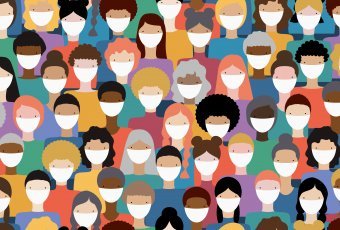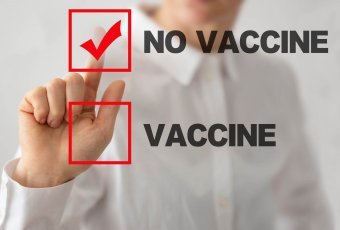COVID-19 | June 5, 2020
Help Frontline Healthcare Workers Manage their Mental Well-Being During a Pandemic
Reading Time: 4 minutes

The COVID-19 pandemic is an unsettling and anxiety-inducing time for everyone. Frontline healthcare workers are especially vulnerable to negative mental health effects as they continue to care for sick patients while dealing with worries about contracting the virus themselves and bringing it home to their families. Many are struggling with fears related to a lack of sufficient PPE (personal protective equipment) and with moral injury.
Jessica Gold, MD, assistant professor of psychiatry at Washington University, points out that “To an outside observer, health care workers look strong and resilient in the face of the unknown.” However, she continues, underneath that calm exterior, many are struggling to keep it together. “They are anxious and they are afraid. They aren’t sleeping and they find themselves crying more than usual.”
Increased Risk of Mental Health Issues

A recent JAMA study looked at the mental health outcomes of more than 1,200 healthcare workers in China who cared for hospitalized patients with COVID-19. High rates of symptoms of depression, anxiety, insomnia, and distress were reported.
There is a significant long-term psychological toll resulting from quarantine, as well. Studies from the SARS epidemic revealed that healthcare workers experienced an increased incidence of acute stress disorder, alcohol abuse, and depression. Many never returned to work. And three years after the epidemic ended, PTSD (post-traumatic stress disorder) of healthcare workers was more severe than the general population.
Recognizing the Warning Signs

As a healthcare worker, you may experience clinically significant stress-related disorders, such as PTSD, secondary traumatic stress, or burnout due to chronic workplace stress and exposure to traumatic events during the coronavirus crisis.
It’s important to protect your well-being so that you can provide the best care for others. If you experience any of the following signs, ask for help:
- Sadness, depression, or apathy
- Feelings of frustration, irritation, or anger
- Feeling nervous, anxious, or overwhelmed
- Insomnia or constant fatigue
- Inability to concentrate
- Excessive worry or fear about something bad happening
- Exaggerated startle response or being constantly “on guard”
- Physical signs of stress, such as an elevated heart rate
- Lack of motivation and poor self-care (i.e., hygiene)
- The feeling that others’ trauma is yours
- Feeling like a failure or that you are not doing your job well
- Use of alcohol or other drugs to cope
Tips for Coping and Reducing Stress Reactions

Frontline healthcare workers can do the following to proactively reduce the emotional toll during the pandemic:
- Talk to family, friends, supervisors, and coworkers about your feelings and experiences
- Identify and accept those things which you do not have control over
- Remind yourself that everyone is in an unusual situation with limited resources
- Recognize that you are performing a crucial role in fighting this pandemic and that you are doing the best you can with the resources available
- Limit working hours to no longer than 12-hour shifts
- Maintain a healthy diet and get adequate sleep and exercise
- Increase your sense of control by keeping a consistent daily routine when possible
- Take breaks from watching, reading, or listening to news stories, including social media
- Avoid or limit caffeine and use of alcohol
- Engage in mindfulness techniques, such as deep breathing exercises, meditation, or journaling
- Ask for help if you feel overwhelmed or concerned that COVID-19 is affecting your ability to care for your family and patients as you did before the outbreak
Resources to Help Frontline Healthcare Workers Manage Mental Well-Being
- COVID-19 Behavioral Health Resources – S. Department of Health and Human Services
- Fight COVID-19 with better sleep health: A guide for hospital workers – Center for the Study of Traumatic Stress
- PULSE Check – Resource from Boston Medical Center to help healthcare workers self-evaluate stress level during and following a crisis
- Caring for our caregivers during COVID-19 – American Medical Association
- Supporting Families of Healthcare Workers Exposed to COVID-19 – Center for the Study of Traumatic Stress
- Creating a resilient organization for health care workers during a crisis – American Medical Association
- Mask Match – Resource for accessing face masks
- PeerRxMed™ – Free peer-to-peer support program for physicians and other healthcare team members
- Physician Support Line – 1-888-409-0141
- Frontline Nurses Wikiwisdom Forum – Virtual safe space where nurses can share their challenges and experiences during COVID-19
- ONE MIND PsyberGuide – Guide for choosing mental health apps and digital tools
- SAMHSA’s (Substance Abuse and Mental Health Services Administration) National Helpline – 1-800-662-HELP (4357)
- National Suicide Prevention Lifeline – 1-800-273-TALK (1-800-273-8255)
ACP Decisions creates evidence-based video decision support tools that promote effective advance care planning and are easily accessible on a user-friendly technology platform. Find more resources and information by visiting our blog. If you’d like to learn more about implementing an advance care planning initiative in your organization, contact us today.
You might also like...

Understanding the Obstacles to Telehealth
COVID-19, GENERAL, TECHNOLOGY | 3 MIN READ

The Vital Role of Community-Centered Care ...
COVID-19 | 3 MIN READ

Understanding and Overcoming Vaccine Hesit...
COVID-19 | 3 MIN READ
